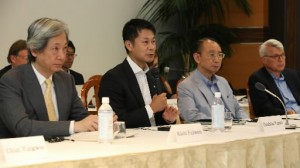Hiroshima Round Table ends with chairman’s summary, calls on countries to have dialogue on nuclear disarmament
Aug. 30, 2016
by Hiroshi Ebisu, Staff Writer
The Hiroshima Round Table, a meeting to explore a path toward nuclear disarmament in East Asia, closed on August 29 after holding a plenary session at a hotel in Hiroshima. The chairman’s summary stated that North Korea’s nuclear development has led to immense security anxieties, and it proposed a regional dialogue that involves the governments of at least four nations: Japan, the United States, China, and South Korea. This three-day meeting was sponsored by the Hiroshima prefectural government.
The 17 participants, including former foreign ministers, former high government officials, and university professors from Japan, the United States, China, and South Korea, held closed-door discussions. A news conference was held after all sessions concluded. The summary welcomed the possible changes in U.S. nuclear policy, including the “no first use” of nuclear weapons, which President Barack Obama is reportedly considering. The summary stated that “this policy will not weaken the security assurance that has been offered (by the U.S.) to U.S. allies.”
It also called for a government-level dialogue among the four countries for nuclear disarmament in East Asia and said that the Hiroshima Round Table can play a role in promoting negotiations at the government level. The summary also proposed prohibiting the development of long-range cruise missiles with nuclear warheads.
This meeting is part of the prefectural government’s “Hiroshima for Global Peace” plan. The first such meeting was held in fiscal 2013, and this marked the fourth meeting. Hiroshima Governor Hidehiko Yuzaki, one of the participants, said, “I hope the results of this meeting will make an impact on the global movement for nuclear disarmament.”
On the sidelines of the meeting, a public symposium was held at the International Conference Center Hiroshima on August 29. Some participants of the meeting exchanged their views on a security framework that does not depend on nuclear weapons. About 100 people attended the symposium.
(Originally published on August 30, 2016)
The Hiroshima Round Table, a meeting to explore a path toward nuclear disarmament in East Asia, closed on August 29 after holding a plenary session at a hotel in Hiroshima. The chairman’s summary stated that North Korea’s nuclear development has led to immense security anxieties, and it proposed a regional dialogue that involves the governments of at least four nations: Japan, the United States, China, and South Korea. This three-day meeting was sponsored by the Hiroshima prefectural government.
The 17 participants, including former foreign ministers, former high government officials, and university professors from Japan, the United States, China, and South Korea, held closed-door discussions. A news conference was held after all sessions concluded. The summary welcomed the possible changes in U.S. nuclear policy, including the “no first use” of nuclear weapons, which President Barack Obama is reportedly considering. The summary stated that “this policy will not weaken the security assurance that has been offered (by the U.S.) to U.S. allies.”
It also called for a government-level dialogue among the four countries for nuclear disarmament in East Asia and said that the Hiroshima Round Table can play a role in promoting negotiations at the government level. The summary also proposed prohibiting the development of long-range cruise missiles with nuclear warheads.
This meeting is part of the prefectural government’s “Hiroshima for Global Peace” plan. The first such meeting was held in fiscal 2013, and this marked the fourth meeting. Hiroshima Governor Hidehiko Yuzaki, one of the participants, said, “I hope the results of this meeting will make an impact on the global movement for nuclear disarmament.”
On the sidelines of the meeting, a public symposium was held at the International Conference Center Hiroshima on August 29. Some participants of the meeting exchanged their views on a security framework that does not depend on nuclear weapons. About 100 people attended the symposium.
(Originally published on August 30, 2016)







